If you’re involved in Content Marketing and SEO, you’ve heard about the Google March Core Update 2024, which focuses on removing spam and low-quality content from search engines.
This newest update is considered one of Google’s most significant updates in recent times. Sites with content deemed of poor quality were simply removed from the search engine results pages (SERPs).
Coincidentally or not, the vast majority of these sites were populated with mass-generated content by Artificial Intelligence, with little to no human editing.
So, that leaves many with the question: Is Google penalizing sites that use AI in content creation? Spoiler alert: The simplest answer is no. However, in SEO, things are more complex and obvious. Let’s understand the nuances.
Download this post by entering your email below
March Core Update and AI: What You Need to Know
The fact that many of the sites penalized by Google contained numerous pages generated by Artificial Intelligence has instilled a certain panic in the SEO world, with claims that, following this update, Google would begin penalizing any use of AI.
We’ve seen many discussions and concerns accompanied by questions like, “Will I lose traffic? Will my pages continue to rank on Google? Is it the end of AI in content production?”
Should I Not Use Artificial Intelligence For Content Production Anymore?
Here, we don’t deal in unfounded panic. So, take a deep breath: Google hasn’t said anything directly about penalizing the use of Artificial Intelligence. What has been said is related to poor quality and non-original content, made solely for search engines and not focused on people.
So, in summary, you won’t be penalized because you used AI on your site, but you might be penalized if you’ve created bad and superficial content generated only to reach the top positions on search engine results pages.
The main issue is to honestly assess whether your content is useful, thorough, reliable, and prioritizes people.
This isn’t new for SEO professionals. In January 2022, during one of Google’s many updates, Vitor Peçanha, one of the founders of Rock Content, emphasized:
“The search engine has been increasing in human awareness, morphing to become more user-focused and human-centric. It must adapt to survive; otherwise, the search results won’t be valuable anymore. Google is forcing all of us to focus on the detailed needs of real people. Ignore Google. Satisfy Users.”
It’s expected that the combination of this update with previous efforts, which have been ongoing since the launch of Google Helpful Content in 2022, will result in a 40% reduction in low-quality and non-original content in search results.
With each update, Google reinforces its goal of ensuring the quality and relevance of the content it ranks.
If it doesn’t penalize AI itself, how does Google’s March 2024 update work?
Google’s core updates, which were even more frequent throughout 2023, always aim to improve the quality of search results. In 2023, Google modified the core updates for March, August, October, and November.
Now, there isn’t a single indicator or system used to conduct this analysis, but rather a set of systems. The focus of this latest update, announced on March 5, 2024, with a one-month deadline for completion, is:
- Enhancements in Quality Ranking: The update includes improvements in ranking algorithms to highlight more useful information in search results and reduce non-original content.
- Updating and Improving Spam Policies: Spam-fighting policies have been revised to exclude low-quality content from searches, such as expired sites used as spam repositories.
According to Elizabeth Tucker, product lead at Google: “This update involves refining some of our core ranking systems to help us better understand if webpages are unhelpful, have a poor user experience or feel like they were created for search engines instead of people.”
We have a comprehensive article about How Google’s March Core Update Works. We recommend reading it if you want to learn more.
A Battle Against Mediocre Content, Not Against Artificial Intelligence
Google is penalizing poor-quality content written to attract clicks—regardless of how it’s created.
If you’re still unsure, here’s a comment from Danny Sullivan and Chris Nelson on behalf of the Google Search Quality Team regarding the use of Artificial Intelligence:
“The goal of Google’s ranking systems is to reward original and high-quality content that demonstrates the qualities of what we call E-A-T: expertise, authority, and trustworthiness. By evaluating your content in this way, regardless of whether you use AI content or not, it’ll be easier to stay in line with what our systems aim to reward.”
The relation between the sites penalized after the update and the use of Artificial Intelligence stems from the fact that, often, content generated by AI in a generalized manner lacks some quality attributes, sometimes being shallow, superficial, or even outdated.
Originality.ai brought some interesting data relating to sites that used AI in bulk and the deindexing process (meaning when Google no longer shows your page or site online): Two percent of the analyzed sites faced manual penalties. And half of the sites that were completely deindexed had over 90% AI-generated content.
In summary, the problem isn’t AI itself but sites that have poor-quality content, lack sources, are unoriginal, and offer inadequate user experience. In fact, in Google’s own words: “There’s nothing new or special creators need to do for this update, as long as they have created satisfactory content made for people.”
Now, you might be wondering: “Okay, I understand. But what exactly is quality content in Google’s eyes?” They have a comprehensive guide explaining how to create useful, reliable content that prioritizes people. Let’s break that down right below.
Google E-E-A-T and the Creation of Trustworthy Content
One of these strategies involves focusing on E-E-A-T: Experience, Expertise, Authoritativeness, and Trustworthiness. E-E-A-T is an important metric used by Google to assess content quality.
Although not a direct ranking factor, Google states that “it’s helpful to use a combination of factors to identify content with appropriate E-E-A-T.”
And what does each item of this acronym mean?
- E: Experience – Evaluates whether the content was created with practical knowledge or experience in the subject matter.
- E: Expertise – Checks if the content author has specialized knowledge in the topic.
- A: Authoritativeness – Considers the reputation of the author and the site regarding the subject matter.
- T: Trustworthiness – Assesses the reliability of the author, content, and site.
Google itself states that trustworthiness is the most important of these, with the other items complementing this main factor.
Analyzing in practice
Imagine you have a question about employee benefits and paid leave policies. When searching for information on the subject, you come across an article on a generic blog with very long paragraphs, just text.
There’s no indication that the content was written (or verified) by an HR professional. The information seems correct, but there’s nothing new or useful for you.
However, when searching for information from another source, you find an article written by Ann Johnson, who has been working in the HR field for over 10 years and is the head of the Human Resources Department in an information technology company.
She discusses laws, brings recent data, and adds information related to her experience. In the middle of the content, there’s a salary estimator tool that helps you gauge your potential earnings based on different factors like hours worked and job position. Besides being easy to use on mobile, the site is interactive, allowing you to adjust variables and see instant results. Additionally, it provides links to relevant resources for further exploration.
Which one seems more appealing?
You can see that implementing content marketing strategies focused on E-E-A-T can help your site align with the expectations of the Google Core Update.
After all, amidst a wave of content produced solely by AI with generic statements, you’ll be establishing a relationship with people who are tired of more of the same, bringing truly relevant insights, unique experiences, new perspectives, and connecting stories.
Practical Tips for Creating People-Centric Content
When creating content, it’s crucial to rely on Google’s guidelines for producing useful and trustworthy material with a focus on the user. Not sure where to start? The search giant itself encourages sincere self-reflection based on the following questions:
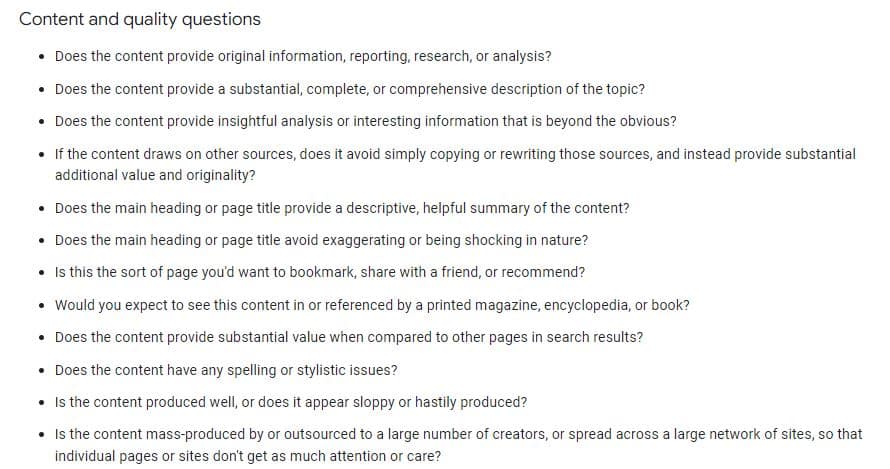

After this moment of self-reflection, let’s get to work. What should you prioritize, then?
Read also: How to Create Content That Will Rank in 2024
Citing Data Sources and Research from Authoritative Sources
Think of reputable sources like governmental departments, established organizations in the field, renowned universities, leading research institutions, and industry experts. In simpler terms, steer clear of relying solely on anecdotal evidence from distant relatives you stumble upon in a Facebook group.
Interview Experts
Seek out experts in the desired subject and ask questions to delve deeper into the content’s theme. Include evidence of the experience involved and the author’s background, which is typically associated with expertise, to bring reliability that Google highly values to your site.
These experts can be from your own company or external references, or even a mix of both, just as we did in this article by including relevant statements from Google authorities as well as from Peçanha, one of the founders of Rock Content.
Important: Ensure that the people chosen to contribute to your article are genuine authorities with experience and expertise to contribute to the subject. There’s no point in grabbing a quote you randomly found on the internet, nor bringing in only quotes that weren’t specifically made for your content.
Here at Rock Content, for instance, our team selects specific experts for each market niche of our clients, ensuring relevance and reliability.
Leverage Experts from Within the Company
Are you creating content about design? Invite the design leader of your company to share an insight, comment on the topic, or bring the experience from within your brand to the subject. It instills confidence and originality and, as a bonus, works on your business’s authority.
You can also host webinars, interviews, and live sessions. Quote them, and add their name, position, and LinkedIn profile in the article.
Consider Using the Same Content in Different Formats
You don’t have to reinvent the wheel all the time. Do you have an article that’s performing very well? How about turning it into a carousel for social media?
Another possibility: Have you done a webinar with a specialist on YouTube? How about using it to craft an article authored by the presenter? We do this here at Rock Content with our biweekly webinar Marketing Backstage, and it works great.
For example, more recently, Carolina Simões, one of our Content Strategy experts, hosted a webinar on the topic “How to Create Content That Will Rank in 2024.”
Then, we asked her to adapt the presentation into a blog post, adding extra information that wasn’t included in the webinar. Same content, different formats, adapting to the audience, and reaching people with different preferences. Score!
Invest in Interactive Content
Interactive content is a type of material that allows direct user interaction, such as quizzes, calculators, and content hubs. These formats increase engagement, expand the database, and encourage the production of future content.
In the context of Google E-E-A-T, interactive content enhances the user experience and demonstrates the authority and reliability of the site, contributing to better ranking in search results.
Moreover, by providing a more engaging and personalized experience, interactive content can increase user retention and satisfaction.
Read also: How Do We Use Interactive Content in Rock Content’s Marketing Strategy?
Rely on Human Editing
The role of the editor becomes essential in this context. Although AI can assist in generating ideas and in the initial optimization of content through well-written and complete prompts, human editing is essential to ensure the quality, authenticity, and relevance of the material.
The expert editor will verify data, information, and the relevance of the quotes and adjust the content as necessary.
Introducing WriterAccess Humanizer
Recognizing the demand for a combination of human effort + AI and the importance of human editors to serve it best, Rock Content has created WriterAccess Humanizer.
Through this tool, you can hire professional editors who analyze content generated by AI, verify data accuracy, the relevance of information, the significance of citations, and adjust the material to be in harmony with the brand’s voice and strategy.
This process ensures that AI-generated content not only engages the target audience but is also aligned with the best SEO practices.
Bet on User Generated Content (UGC)
This approach allows you to leverage authentic and natural content produced by the audience, such as reviews, social media posts, and videos, to promote the brand organically and reliably.
In addition to strengthening customer engagement and loyalty, UGC can increase brand visibility and provide valuable insights into the preferences and behaviors of the target audience.
Consider SEO and User Experience Always Together
Seeing everything we’ve shown so far, you can see the importance of user experience when producing your content. Here at Rock Content, that’s a rule: we always think about SEO and user experience together.
To start your new self-assessment journey regarding your content and your current SEO strategy, mentally answer the following questions:
- Is the content easy to read and adapted for mobile devices?
- When clicking on an internal link, is it contextualized with the reading moment?
- Can the reader identify the main points of the text by skimming through it, i.e., jumping between the headings and the paragraph immediately below each one?
- After reading the introduction, would you want to continue reading?
- If there are banners inserted, do they contain relevant offers for the person interested in that topic? Do they disrupt the reading?
- Are the CTAs appropriate? Are the links working?
- Would you have the patience to read this content structured as it is?
- Do you talk to other stakeholders in the company (Customer Success professionals, UX/UI, etc.) to understand users’ needs, questions, and feedback before producing content?
If you answered ‘no’ to many of these questions, it’s important to review your site/blog’s UX as soon as possible. By prioritizing user needs and expectations, companies can improve customer satisfaction, increase brand loyalty, and ultimately drive business growth.
These elements are indicative of well-founded and reliable content. This human look and care are essential to avoid excessive dependence on AI and to maintain the uniqueness and depth of the content.
Perhaps you’ve already noticed people commenting things like “Thank you, ChatGPT” for comments on social media and stiff content that, well, seems to have been 100% written by AI.
We believe no brand wants to have that kind of association, right?
Expert-driven Content: Your Opportunity to Shine
As I mentioned earlier, Rock Content values specialized materials that include expert quotes and reliable data, and we’ve seen the results of this in practice.
What is Expert-Driven Content?
This type of content is crafted by content and SEO specialists but is supported by subject matter experts, offering firsthand knowledge and perspective on a specific topic.
Recognizing the changes in the digital marketing, SEO, and content landscape since the advent of ChatGPT in 2022, we’ve been considering strategies to implement and understand how to think about organic content in this increasingly AI-dominated scenario.
And we’re pleased to see that, even amid these changes, our clients who relied on this type of content only grew in organic traffic — while those who maintained a more traditional SEO strategy experienced a decline:
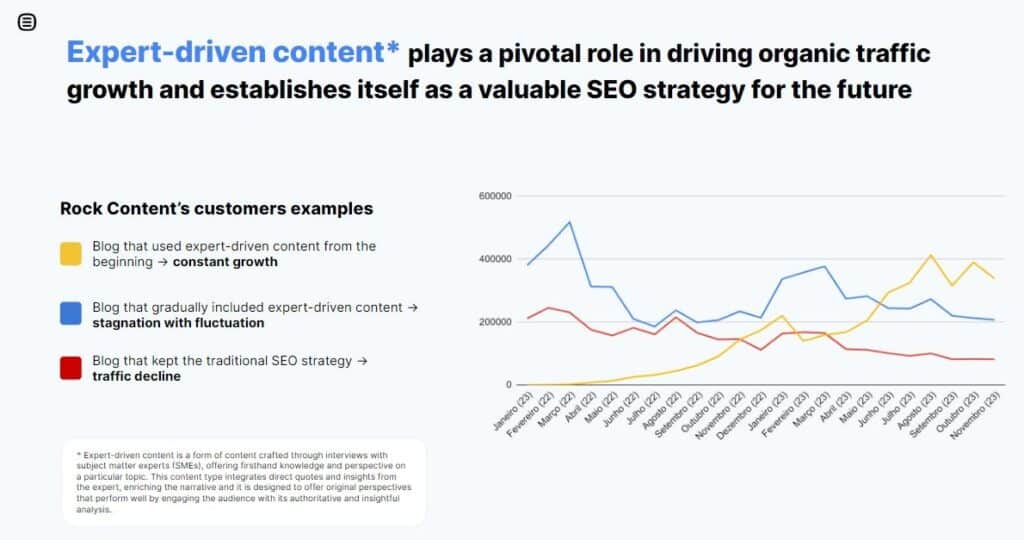
We know that finding industry experts may not be an easy task, requiring time and dedication. That’s why we rely on the experts in our talent network for this stage.
The example below is from a blog post of one of our clients on the food sector, created entirely with our talent pool in an expert-driven content production workflow:

By updating expert-driven content, we’ve seen significant improvements not only in ranking but also in click-through rate (CTR).
We’re talking about a 67% increase in position on the SERP and a 398% increase in click-through rate in three months after the updates following this format.
The Role of Artificial Intelligence in Content Creation
We already understand that artificial intelligence is not a villain for Google. And certainly not for us here at Rock Content.
At WriterAccess, our platform has a network of over 20,000 specialized freelancers, including writers, editors, content strategists, and designers. We rely on AI tools specifically developed to assist in generating ideas and producing optimized content.
They contribute (a lot!) to our agility and efficiency and enhance the scalability and creativity of our content (which, in our opinion, is the best way to use AI in content production).
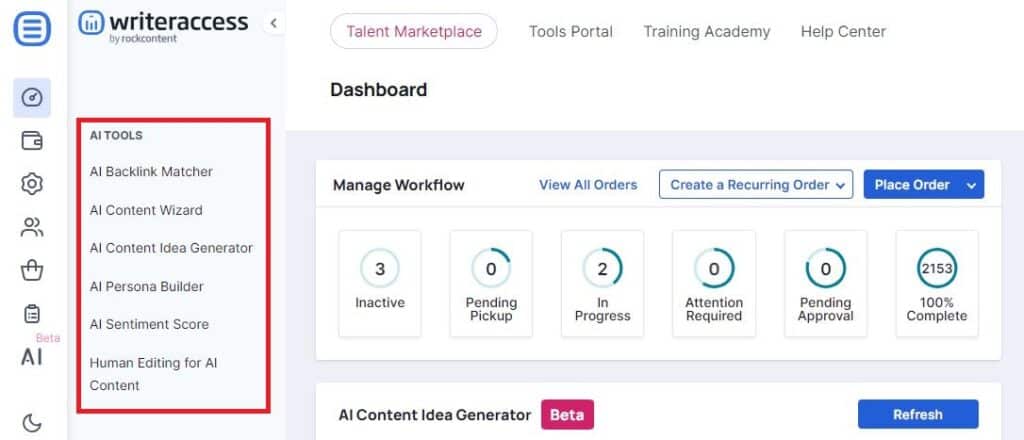
AI Content Idea Generator
[Check out the free version here]
Find content ideas for your editorial calendar with our AI-generated list. This tool helps find current and relevant topics for your target audience, serving as a source of inspiration to build engaging content that resonates with your audience.
AI Persona Builder
The AI Persona Builder is a tool that uses Artificial Intelligence to assist in creating detailed and accurate personas for content marketing strategies.
Based on data and analysis, this tool generates audience profiles that reflect the needs, interests, and behaviors of potential customers, making it easier to create more targeted and effective content.
Read also: Tested and Approved: AI Persona Builder for Creating Buyer Personas in Minutes
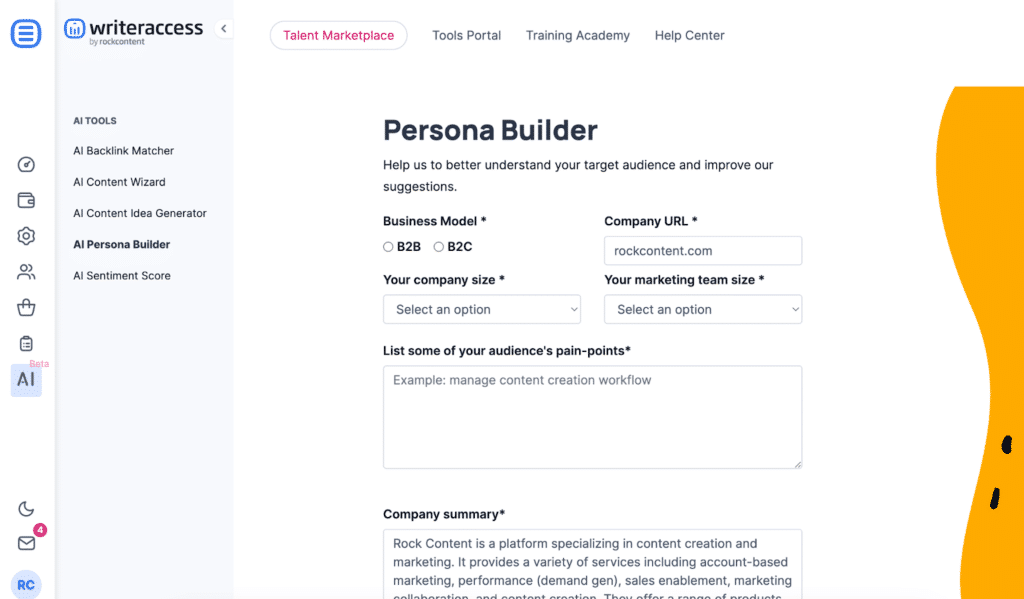
Bonus: If you have the paid version of Chat-GPT, you can also test the Rock Content Persona Creator plugin directly on GPT-4 (here’s how to do it).
AI Content Wizard
By using customized analysis, the AI Content Wizard identifies content opportunities, analyzes keyword gaps, and provides outlines for blog posts optimized to secure top positions on Google.
With detailed insights into your audience and competition, the tool is designed to deliver a content strategy aligned with your business needs, readily utilized by our network of freelance talents to create standout content distinguished by quality and relevance.
AI Backlink Matcher
The AI Backlink Matcher is another innovation from WriterAccess that revolutionizes how SEO professionals and content marketers approach backlink building. This tool employs AI to analyze content and pinpoint highly relevant backlink opportunities, contributing to enhanced authority and online visibility.
Matching your content with high-value sites for backlinks can be a daunting and intricate task, but the AI Backlink Matcher simplifies this process. It offers personalized recommendations that align with your business’s content and niche, making it easier to obtain quality backlinks that can elevate your search engine rankings.
AI Copilot
Yes, Rock Content also has its own tool for building content from scratch entirely with AI. The AI Copilot is a tool developed to generate complete content based on specific criteria. It was created specifically with content creation and SEO in mind.
AI Copilot drafts articles considering the target audience’s persona, relevant keywords for the industry, and brand information, among other essential factors for creating optimized content aligned with marketing objectives.
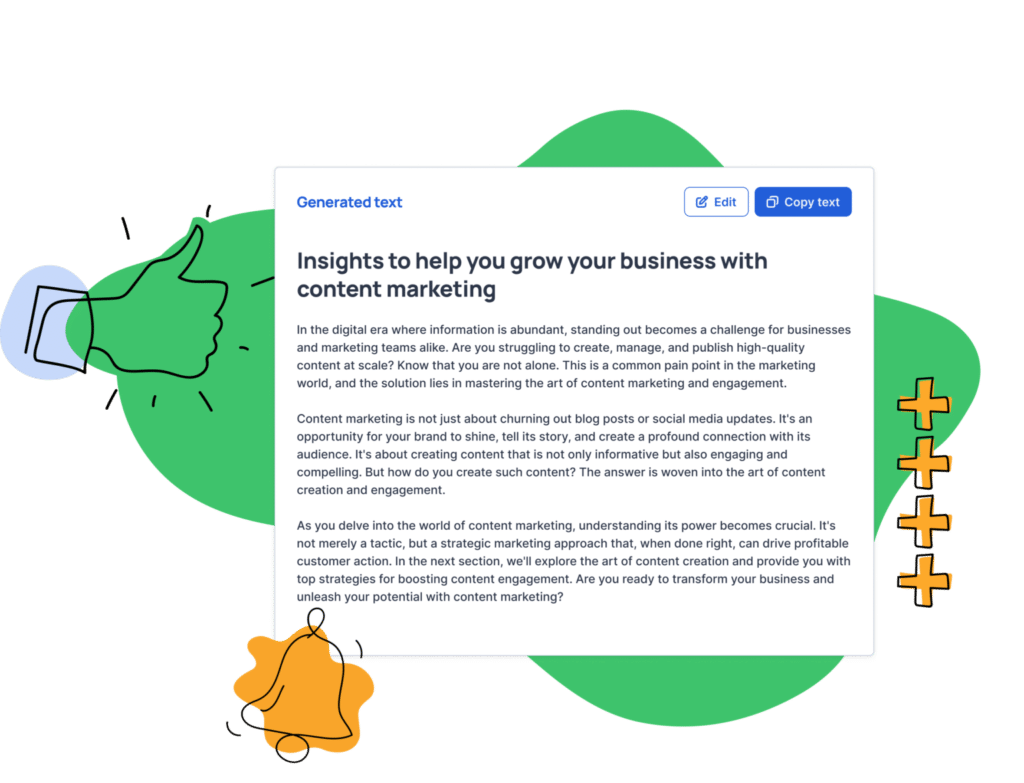
Although AI Copilot is capable of producing entire articles and blog posts, considering everything we’ve presented here, it’s highly recommended that these texts undergo human editing. As a matter of fact, you can send the content to our freelance editors directly on the platform if you want.
It’s important to consider the quality differentiators we’ve mentioned throughout this article, such as expert-driven content, updated data, and reliable references, thus ensuring the authenticity and relevance of the material.
Giuseppe Caltabiano, VP of Marketing at Rock Content, reinforces the need to use AI wisely to achieve the best results: “Our focus is to prioritize the production of quality content, using Artificial Intelligence as a resource to increase productivity and efficiency, without replacing human expertise and originality.“
This strategy ensures that the content not only meets E-E-A-T criteria but also stands out for its authenticity and informational value.
By following these guidelines, content creators can ensure that their work is user-centered, respects Google’s guidelines, and maintains superior quality that AI cannot replicate.
As Roger Montti of the Search Engine Journal states: “The important qualities of content are those provided by a human that an AI is incapable of offering, such as origin, evidence of expertise, origin, and background that a human brings to the topic being written about. Humans bring Experience, Expertise, Authority, and Reliability.“
Conclusion
Despite the scare that deeper Google algorithm updates may cause, don’t overlook their main goal: Ensuring that search results are always the best possible for the user, with original, relevant, reliable, updated, and useful content. By always focusing on this principle, the chances of core updates affecting your traffic decrease considerably.
And let’s be optimistic: These changes also bring opportunities to improve your content and stay ahead of the competition.
The March 2024 Google Core Update is not a monster if you are prepared and informed. And this preparation involves not only understanding the update but also knowing how to integrate it into your content marketing strategy effectively.
Transform your content strategy with WriterAccess! Count on the expertise of specialized human talents in various industries to create rich content and take advantage of AI content creation innovation with AI Copilot. Furthermore, ensure quality with editing by professionals from our base.
Take the next step towards exceptional content: Try WriterAccess for free!

![[Rock NA] State of Marketing Reports 2024 – Comkt Hubspot State of Marketing Report 2024](https://rockcontent.com/wp-content/uploads/2022/07/Banner-Fino-Rock-Convert-2500-%C3%97-500-px-19.png)






